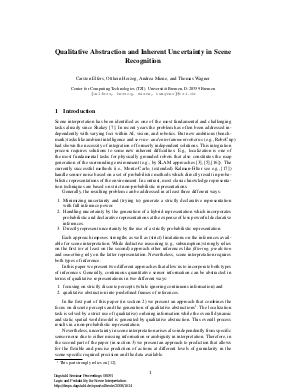Qualitative Abstraction and Inherent Uncertainty in Scene Recognition
Authors Carsten Elfers, Otthein Herzog, Andrea Miene, Thomas Wagner
-
Part of:
Volume:
Dagstuhl Seminar Proceedings, Volume 8091
Part of: Series: Dagstuhl Seminar Proceedings (DagSemProc) - License:
 Creative Commons Attribution 4.0 International license
Creative Commons Attribution 4.0 International license
- Publication Date: 2008-10-23
Files

PDF
DagSemProc.08091.11.pdf
- Filesize: 370 kB
- 15 pages
PDF
DagSemProc.08091.11-add.pdf
- Filesize: 374 kB
Document Identifiers
Subject Classification
Keywords
- Scene interpretation
- intentional agents
- uncertainty
- qualitative abstraction
- coherence-based perception
- abduction
- RHMM
Metrics
- Access Statistics
-
Total Accesses (updated on a weekly basis)
0Document
0Metadata
Abstract
The interpretation of scenes, e.g., in videos, is demanding at all levels. At the image processing level it is necessary to apply an "intelligent" segmentation and to determine the objects of interest. For the higher symbolic levels it is a challenging task to perform the transition between quantitative and qualitative data and to determine the relations between objects. Here we assume that the position of objects ("agents") in images and videos will already be determined as a minimal requirement for the further analysis.
The interpretation of complex and dynamic scenes with embedded intentional agents is one of the most challenging tasks in current AI and imposes highly heterogeneous requirements. A key problem is the efficient and robust representation of uncertainty. We propose that uncertainty should be distinguished with respect to two different epistemological sources: (1) noisy sensor information and (2) ignorance. In this presentation we propose possible solutions to this class of problems.
The use and evaluation of sensory information in the field of robotics shows impressive results especially in the fields of localization (e.g. MCL) and map building (e.g. SLAM) but also imposes serious problems on the successive higher levels of processing due to the probabilistic nature. In this presentation we propose that the use of (a) qualitative abstraction (classic approach) from quantitative to (at least partial) qualitative representations and (b) coherence-based perception validation based on Dempster-Shafer (DST) can help to reduce the problem significantly.
The second important probability problem class that will be addressed is ignorance. In our presentation we will focus on reducing missing information by inference. We contrast/compare our experiences in an important field of scene interpretation namely plan and intention recognition. The first approach is based on a logical abductive approach and the second approach in contrast uses a probabilistic approach (Relational Hidden Markov Model (RHMM)).
Cite As Get BibTex
Carsten Elfers, Otthein Herzog, Andrea Miene, and Thomas Wagner. Qualitative Abstraction and Inherent Uncertainty in Scene Recognition. In Logic and Probability for Scene Interpretation. Dagstuhl Seminar Proceedings, Volume 8091, pp. 1-15, Schloss Dagstuhl – Leibniz-Zentrum für Informatik (2008)
https://doi.org/10.4230/DagSemProc.08091.11
BibTex
@InProceedings{elfers_et_al:DagSemProc.08091.11,
author = {Elfers, Carsten and Herzog, Otthein and Miene, Andrea and Wagner, Thomas},
title = {{Qualitative Abstraction and Inherent Uncertainty in Scene Recognition}},
booktitle = {Logic and Probability for Scene Interpretation},
pages = {1--15},
series = {Dagstuhl Seminar Proceedings (DagSemProc)},
ISSN = {1862-4405},
year = {2008},
volume = {8091},
editor = {Anthony G. Cohn and David C. Hogg and Ralf M\"{o}ller and Bernd Neumann},
publisher = {Schloss Dagstuhl -- Leibniz-Zentrum f{\"u}r Informatik},
address = {Dagstuhl, Germany},
URL = {https://drops.dagstuhl.de/entities/document/10.4230/DagSemProc.08091.11},
URN = {urn:nbn:de:0030-drops-16141},
doi = {10.4230/DagSemProc.08091.11},
annote = {Keywords: Scene interpretation, intentional agents, uncertainty, qualitative abstraction, coherence-based perception, abduction, RHMM}
}
